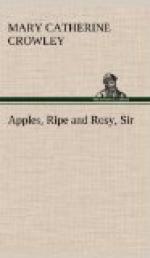“Indeed, mother, He will—He does,” said Bernard tenderly, though in the matter-of-fact manner which he knew would best arouse her. “You are all tired out, or you would not speak in that way. You must have a good rest. Keep the rooms warm, so that you will not take any more cold, and before long you will be able to rattle the type-writer at a greater speed than ever. That reminds me, mother,” he continued—seeing that she was beginning to recover herself, and wishing to divert her thoughts,—“one of the things we have to be thankful for is that this house is easily heated. It beats all the way coal does last here! The ton we got two months ago isn’t gone yet,”
“That is the way coal lasts when there is not any one to steal it, as there was in the flat, where the cellars were not properly divided off,” answered Mrs. Farrell, brightening up.
“No, there’s nobody living immediately around here whom I’d suspect of being mean enough to steal coal,” returned Bernard, carelessly,—“except, perhaps, Stingy Willis, I don’t think I’d wager that old codger wouldn’t, though.”
“I am afraid I should not have entire confidence in him, either,” agreed Mrs. Farrell.
But the intelligence that there was still coal in the bin had cheered her wonderfully. Repenting of her rash conclusion, she hastened to qualify it by adding, “That is, if half of what the neighbors say is true. But, then, we have no right to listen to gossip, or to judge people.”
Stingy Willis, the individual who apparently bore an unenviable reputation, was a small, dried-up looking old man, who lived next door to the Farrells,—in fact, under the same roof; for the structure consisted of two houses built together. Here he dwelt alone, and attended to his household arrangements himself, except when, occasionally, a woman was employed for a few hours to put the place in order. He was accustomed to prepare his own breakfast and supper; his dinner he took at a cheap restaurant. He dressed shabbily, and was engaged in some mysterious business down town, to and from which he invariably walked; not even a heavy rain-storm could make him spend five cents for a ride in a horse-car. And yet he was said to be very wealthy. Persons declared they knew “upon good authority” that he held the mortgage which covered the two connecting houses; that, as the expression is, he “had more money than he knew what to do with.” Others, who did not profess to be so scrupulously exact in their determination to tell only a plain, unvarnished tale, delighted in fabulous stories concerning his riches. They said that though the floor of his sitting-room was carpetless, and the bay-window curtainless but for the cobwebs, he could cover the one with gold pieces and the other with bank-notes, if he pleased. Many were convinced he had a bag of treasure hidden up the chimney or buried in the cellar; this they asserted was the reason he would not consent to having the upper rooms of the house rented, and so they remained untenanted season after season. Thus, according to the general verdict (and assuredly the circumstantial evidence was strong), he was a miser of the most pronounced type,—“as stingy as could be,” everybody agreed; and is not what everybody says usually accepted as the truth?




